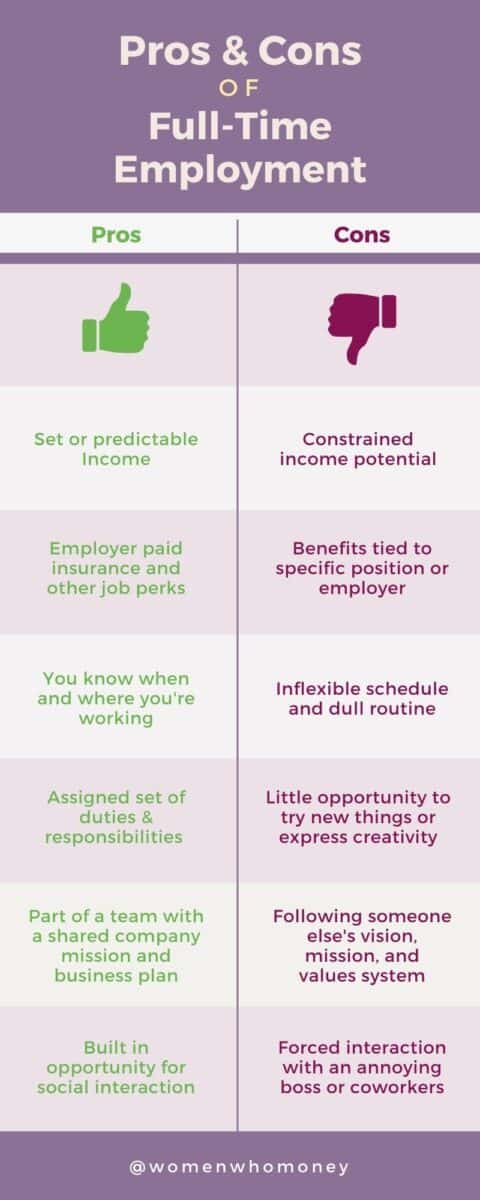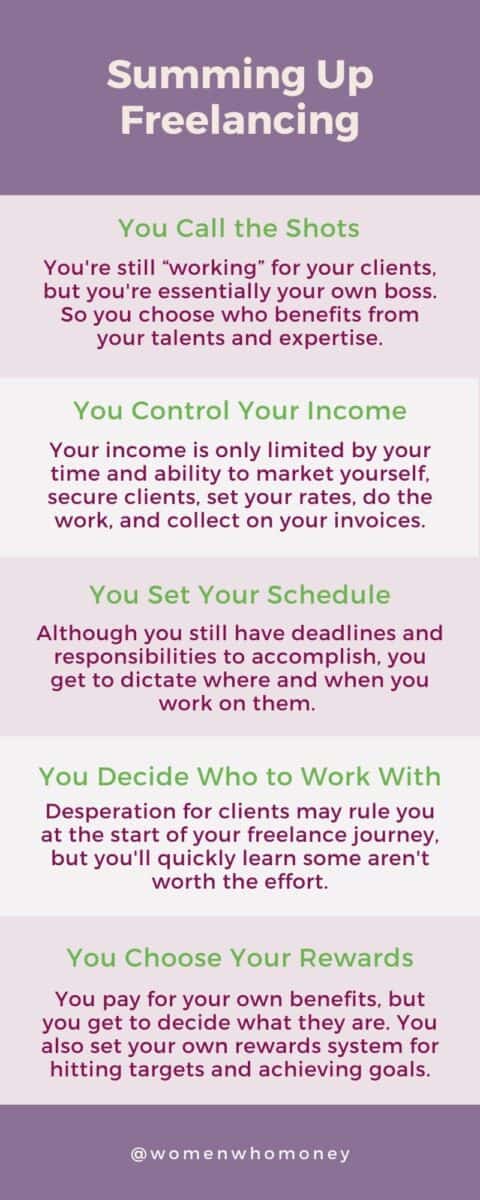Should I Quit My Job to Freelance? [The Pros & Cons]
(This page may contain affiliate links and we may earn fees from qualifying purchases at no additional cost to you. See our Disclosure for more info.)
According to the “Freelance Forward: 2021” study conducted in the fall of 2021, some 59 million Americans performed freelance work in the prior 12 months. That's more than one-third (36%) – of the entire U.S. workforce.
So, chances are you've been hearing a lot about freelancers who are killing it, living the high life by being their own boss.
That sounds mighty good, seeing how you dislike your job and seek a healthier work-life balance, right?
Still, you know it's wise to consider the pros and cons of your 9-to-5 job and learn more about what freelancing really entails before typing up your resignation letter and quitting to embark on a freelance career.
So let's get to it!

What is Freelancing Anyway?
A freelance worker is essentially an individual who performs a service for a business at a predetermined rate and not as an employee of that business. Freelancer rates are often hourly or project based but can also be per day or task.
Consultant, independent contractor, or contract worker, are other terms for someone who freelances. Freelance opportunities may be listed as contract work, contract to hire, contract consultant, or freelancer jobs.
Self-employed freelancers enjoy the ability to work for as many different companies as they wish, at a rate they negotiate, instead of being tied to one employer.
Other independent contractors not interested in establishing their own business and all that it involves may use an agency to subcontract them out to other companies. Well know agencies include Kelly, Robert Half International, and Kforce, but numerous agencies exist.
Freelancer work is available in a vast number of fields, including:
- Accounting and Finance
- Administration
- Analytics
- Architecture
- Business Consultancy
- Customer Service
- Data Science
- Design and Creative Arts
- Engineering
- Gaming and Software Development
- IT and Networks
- Law
- Marketing
- Recruiting
- Sales
- Transcription
- Translation
- Website and App Design and Development
- Writing and Editing
- and More
In this article, when we discuss freelancing, we're referring to being a self-employed person.
Pros & Cons of Having a Job
You can't deny working as an employee has its perks, but it certainly isn't all rosy either.
Weigh the following pros and cons of earning a paycheck to help you decide if going the full-time entrepreneurial route makes sense for you.
Pro: A Stable Source of Income & Benefits
You're used to having money come into your checking account on a given day. A full-time job with a steady income and a set pay period is ideal.
Knowing when and how much money you've got coming helps you set your budget. You can also take advantage of this to set up automatic bill payments or, even better automatic transfers to a savings account.
As a full-time employee, you have a sense of job security. You rest easy knowing you'll get paid in time to pay the rent at the end of the month.
You also like knowing you've got medical coverage when you're sick and will receive pay for time off during vacations and holidays.

As a full-time freelancer, you must find potential clients to build up an initial client base. Then you must continue pitching your services to avoid a significant lull in business.
You alone will pay for health insurance and other traditional employee benefits, remind customers to pay for their work, and incur business expenses that most office job workers or salaried employees don't face.
Also, when you work a W-2 job, your employer is withholding Social Security and income taxes for you and direct depositing your funds into your bank and any investment accounts.
They're also tracking your income and reporting it to you and the IRS, making it pretty easy peasy for you to file your taxes by April 15th each year.
As freelancers and business owners, your earnings and expenses are your own to track and report. You'll be filing and paying quarterly estimated income taxes. Your finances and taxes can quickly become complicated.
Con: Limited Income
In 2021 many people quit their jobs to pursue new opportunities, several were seeking safer work conditions or more flexibility, but many left to pursue higher wages.
Due to the competition for workers, wages in some markets grew faster than usual, benefiting those changing jobs.
The New York Times reports hourly pay was up 4.3 percent on average in November 2021 for job movers, compared to a 3.2 percent gain for people who remained in their jobs.
Not bad, but nothing to write home about, either. Especially considering the average cost of living is growing a lot faster in most areas.
You can cross your fingers and toes and hope for a new position with a higher salary. Or that your current employer is feeling generous enough to give you a bump in your pay. You can try to negotiate your next raise, but sometimes it's just out of your hands.
If customers aren't buying your employer's products, chances are your boss won't be opening the vault. And what if the head honchos over at corporate headquarters decide all the cubicle warriors aren't getting more than 1% this year?
Those who quit full-time employment to become full-time freelancers have more control over their income. They set their rates and decide how much they want to work. And pitch to prospective customers until the cows come home if they desire.
There's a reason freelance writers, bloggers, and creators making six figures year after year in their freelance business litter the internet with their stories.
Most freelance business owners don't have to worry about frozen wages or corporate pencil pushers. All they do is get paid.
Pro: You Have a Fixed Schedule
At 3 p.m, on a Wednesday, everybody knows where to find you: sitting in your cubicle.
Your daily schedule rarely, if ever, changes: at your desk by 8 or 9; pushing away from it by 5 or 6 p.m.; weekends off.
A regular work schedule makes it easy to plan the rest of your life. Karate on Tuesday night. Soccer on Wednesday. Hairdresser on Thursday. Brunch on Sunday.
Freelance life can offer greater variety or flexibility in a schedule. Yet, those who thrive with structure or procrastinate when left entirely on their own to get things done benefit, from a fixed schedule.
As an employee, you don't have to worry about setting up your freelance business as a sole-proprietorship or Limited Liability Company (LLC), creating a business plan, or ordering and paying for business cards.
While working as a freelance designer has its benefits, there are far more business oriented responsibilities with a deadline that you'll also face that a full-time employed graphic designer won't.

Con: You Have a Fixed Schedule
A set daily schedule for 8 or 10 hours means other life tasks must get done outside that time frame.
Shopping, groceries, banking, doctor's appointments: all of this must get done in the time you have left at night or over the weekend.
With the vast majority of people running on the same schedule, you'll be dealing with crowds everywhere you go. You need to experience empty stores on a Tuesday morning to see how good it feels.
Banks close at 4 or 5 p.m. every day in many places, with maybe one later evening exception. And they're not typically open on weekends. Seeing a doctor or a dentist on a Sunday afternoon? Not happening in most towns.
Freelancers set their schedules. If a freelance writer books a doctor's appointment on a Wednesday, it's easy for them to catch up on work later that night. Problem solved.
If you have career aspirations greater than your current job provides, you may feel underappreciated, stifled, or even a victim of discrimination.
A fixed set of responsibilities that don't excite and a limited company career trajectory can squash the enthusiasm of even the most eager of employees.
Pro: Social Interaction
When you work in a regular job, there's always someone to talk to about your weekend, the TV series you just binged, or how your kid's potty training is coming along.
It may be a bit more challenging when working remotely. Still, tools like Zoom or instant messaging software helps you connect to a built in network.
You can go out to lunch with your colleagues, grab a drink after work, or meet up online for a happy hour. Some coworkers may even become good friends, with who you'll get together at other times.
Con: Annoying Boss and Coworkers
Chances are you're considering quitting your 9-to-5 for full-time freelancing due to job burnout, a lousy boss, or a difficult coworker.
According to a survey by Randstad,
- 60% of workers left jobs, or are considering leaving one due to a dislike of their direct supervisor
- 53% have left or are considering leaving a job because they don't believe their employers are recruiting and retaining other high-performing individuals
- 58% have left or are considering leaving a job, due to nasty office politics
- 38% of workers want to leave their current job due to feeling they don't fit in or due to a toxic work environment
- 46% cite their teams/departments understaffing, for why they are seeking or considering other employment
While having someone to talk to or grab lunch with can be a good thing, being forced to deal with a fellow employee or toxic work situation might be more than you can take.
Since freelancers often work from home and do much of their work online, they may not see many people. Lots of communication happens through email. And freelancers rarely meet customers as many are too far away.
Freelance jobs often require spending many long days staring at computer screens, typing away.
When running an online business, you may have to force yourself to leave the house – to hit the gym, get some shopping done, take a walk around the block, or network.
If you’re a very social person, you will need to find ways to deal with isolation. This can be a real challenge if you don't already have a social or freelance crew outside of your day job.
Summing Up Freelancing
- You call the shots – to a point. You're still “working” for your clients, but you're essentially your own boss. You get to choose who benefits from your expertise.
- You have more control of your income – but you must market yourself, secure clients, set your rates, and collect on your invoices.
- Work where and when you want – although you still have deadlines and responsibilities to accomplish, you'll need to stay motivated to be a successful freelancer.
- Work with who you want – while you might be desperate for any client, in the beginning, you'll quickly learn some aren't worth the effort, and you'll be able to move on.
- You choose your benefits and rewards – you might have health insurance and dental coverage through a spouse or parent but want a term life insurance policy of your own. You may also choose to reward yourself with classes to improve your skills or learn new software as you meet goals and revenue targets.
Becoming a freelance photographer or real estate agent, engaging in freelance writing, graphic design, social media management, virtual assistance, or a whole host of other freelancing opportunities can be extremely rewarding.
Still, it's also not for everyone. There are significant challenges to being an entrepreneur.

So Full-Time Job or Freelancing?
Sorry, there’s no clear-cut answer on if you'll succeed as a full-time freelancer or should keep your job instead.
You need to spend some time considering if it’s the right direction for you. Many have tried freelancing; some are successful.
Others soon decide a different career or position, a job-sharing role, or a part-time side hustle better meets their need for passion, profit, and flexibility.
We both have enjoyed freelancing opportunities, but we also took advantage of being an employee for years. At different times in life, one can be more beneficial, and sometimes a little of both is the right mix, especially as you grow your business.
Before making your decision, weigh all the above pros and cons.
Then be sure to do all these things before going freelance if you decide to quit your job and take the leap.
Next: Why You Need a Business Credit Card When Self-Employed

Written by Women Who Money Cofounders Vicki Cook and Amy Blacklock.
Amy and Vicki are the coauthors of Estate Planning 101, From Avoiding Probate and Assessing Assets to Establishing Directives and Understanding Taxes, Your Essential Primer to Estate Planning, from Adams Media.
